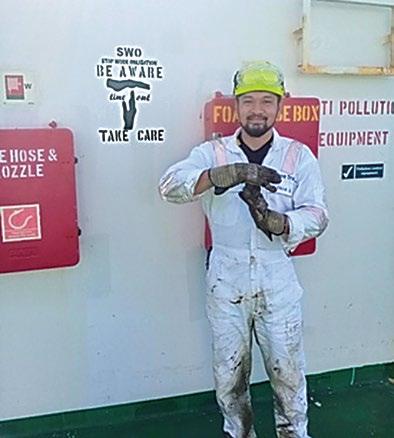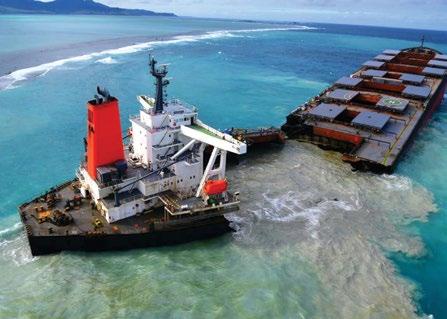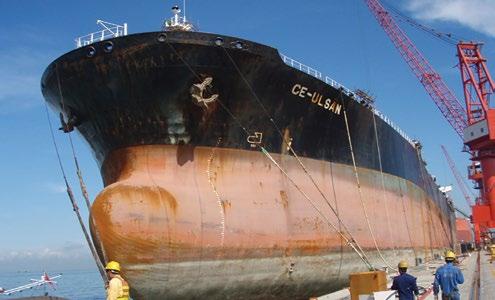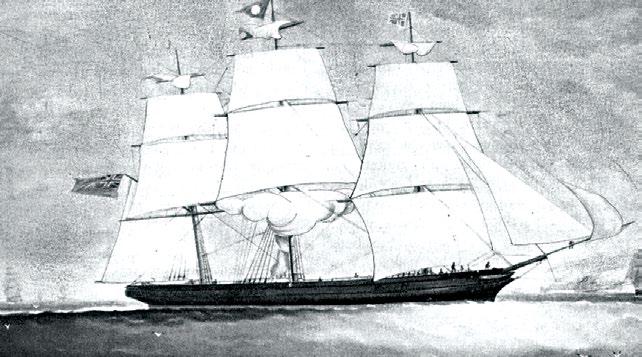
7 minute read
Safety First
from Wavelength #73
SAFETY FIRST! from the SQE Department
Message from the DPA: Learn & Improve instead of Blame & Punish
Advertisement
Dear seafarers, The Company’s NO BLAME culture is something that Having been a member of a shipping company for a number of years, I have come to realize that learning how work is done onboard is very difficult. Work as imagined and work as done are not the same. Seafarers are the experts onboard and the written systems and procedures are only a mirror of their successful work. we all need to work on and constantly try to improve. As a result of this effort, we have launched our recent campaign: changing SWA to SWO. Changing just one word? Can Authority becoming Obligation actually make a difference? Words are powerful and it’s important And here comes the oxymoron: “The higher up and the for us all to be aware of how further away you are from an awareness of workplace Elli Moretti we use them. Using the right hazards – the lower down and the further away you are words, being clear, positive, from influencing the work systems”. polite and humble, not only improves So, can these systems protect you? If your expertise feedback is communication but also safety. Such available on how to improve the processes and what safeguards a seemingly small change can have a are needed, then yes! tremendous impact on your onboard On the other hand, learning your work systems is your most relations. powerful tool for safety & reliability, but it is something that NO BLAME behaviour always starts at takes effort. The enemy of learning is knowing – when you think the top, it encourages good relations and creates clear lines of you know a task, you will not ask important, relevant questions. communication: Be curious, be smart, be humble. • Leaders of all levels shape how the organisation learns by Waiting for failure to occur is too late – learn while operations their reaction to failure. All eyes are on them. are normal. • Be ready to receive feedback even when it is bad. But failures at some point are inevitable... Error is normal. People make mistakes; they are not machines. We all need to strive for a work environment where it is safe to fail and learn. This can be • Communication at all levels is important and it can only be achieved with good relationships. achieved by asking what failed instead of who failed. • If you don't know what's wrong, it can't be rectified. Sometimes we think we can fix the problem by fixing the person ALWAYS REMEMBER: You can blame and punish or you can learn who failed by blaming them. But blame is the opposite of and improve, but you can't do both. encouragement. No one can improve in this way because mistakes are not choices and errors are not a conscious decision to fail – I wish you calm seas and safe voyages, error is an unintended deviation from an expected outcome. Elli Moretti

We wish to thank ALL fleet vessels for embracing Health and Safety campaigns and for providing feedback of their onboard implementation with such enthusiasm! As there is no space to address each and every one of you separately for your efforts in the SWO campaign, this time we chose M/T MIKELA P. So thank you Cpt. Leonid Yelenchuk for sending us this great “time out” photo!

Root cause: birthday party celebrations? Grounded bulk carrier Wakashio breaks apart off Mauritius
A Japanese bulk carrier that ran aground on a reef in Mauritius last month threatening a marine ecological disaster around the Indian Ocean island has broken apart, authorities said on Saturday. The vessel struck a coral reef on July 25, spilling about 1,000 tonnes of fuel oil and endangering corals, fish and other marine life in what some scientists have called the country’s worst ecological disaster. The press revealed that the 58-year-old captain of the ill-fated newcastlemax Wakashio could face negligence charges after it emerged the crew were celebrating a crewmember’s birthday and had headed nearer towards the Mauritius coastline to get a wifi signal just prior to the bulk carrier’s grounding on the reef! The Flag Administration, Panama Maritime Authority, had earlier suggested the ship ran into difficulty because of bad weather, although data providers have shown there was no inclement weather around southern Mauritius at the time of the accident. Thereafter, Panama Maritime Authority’s preliminary investigation into the grounding of the bulker vessel Wakashio off Mauritius says it deviated from its course to pick Keep your Behavoural Barriers STRONG! up an internet connection relating to an onboard celebration. The Panama authorities BarrierspreventtheHazardfrombecomingsay the statement is ‘not designed to apportion blame’. anIncident
Keep your Behavioural Barriers STRONG!

When all your barriers don’t work properly at the same time... the holes line up... then the hazard passes through and results in an incident! TRUST:
TEN Really Useful Safety Tips PROMOTE YOUR MENTAL HEALTH!

This is as much as the seafarer can do for themselves. Always pay attention to the signals your mind and body are giving you and ask for help if you are in a crisis situation. Your safety is the number one priority. 1. Socialize: Take time for regular tours round the ship and have informal chats. Spend time with others and participate in the social life onboard. 2. Don’t keep problems to yourself: Share your problems with a person close to you, on board or ashore. If you feel lonely, reach out to others, do something together. This can give anyone a sense of time out and can be a good distraction.
3. Do not neglect the importance of physical
wellness: -Eat well: A healthy diet is the A and Z to a sense of wellbeing. -Get a quality sleep: Set an alarm at a regular time each day, avoid the computer when you go to bed, and use your bed mainly for sleep. -Exercise: Exercise can clear your thoughts and get you into a better state of mind to deal with your problems. 4. Identify the source of your stress: Make a list of the things worrying you or talk them over with someone you trust to identify the main causes of stress. Then plan your action. TRUST: Ten Really Useful Tips 5. Engage with others in a respectful way: A STRONG Behavioural Barriers key component of wellbeing is a harmonic coexistence with others. Be respectful and this 1. Chronic Unease: worry respect will be reflected back. If there are any about what can go wrong. problems, deal with them as soon as possible. Do not tolerate bullying and harassment.
2. Avoid complacency: do not 6. Do not underestimate the impact of
let your guard down.details: You may feel broken down, but even small things like having an open door to your 3. Observe differently: spot cabin or watching a movie in the common weak signals. areas can make a difference to your mental health after a while. 4. Situational Awareness: be 7. Be present: Train yourself in the practice of aware of your surroundings. mindfulness meditation to bring attention to whatever is happening in the present moment. 5. Safety Intervention: act This helps you to manage your stress and find during unsafe situations inner peace. . 8. Take initiatives: Encourage social 6. Alert others to follow safe activities on board, don’t wait for others to practices. think of all the good ideas! 9. Take care of others: Reach out to any of 7. Adopt a no blame your colleagues who seem to be feeling down. behaviour. Even the smallest act can count, whether it's a smile, a thank you or a kind word. 8. Teamwork: Proper DWPM 10. Remain vigilant: Look out for the warning and tool box talks are vital. signs in yourself and others. The following factors may indicate a mental health problem: 9. Don’t be afraid to voice • Changes in behaviour or mood
your opinion.
• Changes in effectiveness at work 10. Show that you care when • Inability to focus/make decisions someone is having a hard • Changes in eating habits time.• Use of alcohol/ drugs.



